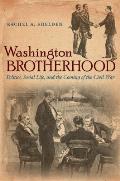“The People and the Electoral College” Conversation, 9 Nov.
As we await the official results of the U.S. Presidential election, I can’t help but note that a system based on the popular vote would not only have provided a clear answer by now, but would also have ensured that the newly elected President and Vice President would be, as the Declaration of Independence said, “deriving their just powers from the consent of the governed.”
Instead, we have the Electoral College system, so the world is watching to see if the political leader of the American people will actually be the choice of the American people.
On Monday, 9 November, Framingham State University history professor Joseph Adelman will host a timely conversation with Rachel Shelden on “The People and the Electoral College.”
The event description says:
Through the entire 1900s, our popular vote and the Electoral College always agreed, though the latter often distorted the magnitude of a President’s victory. There were many efforts to reform the Presidential election system, and the American people consistently supported those efforts in polls, but none succeeded, partly because the problem didn’t seem that pressing.
In the 2000s, we’ve had six popular votes, two overturned by the Electoral College and one 120,000 Ohio votes away from meeting the same fate. While the problems with that system have become evident, those elections have also brought out defenders who are loath to give up unfair advantages to their side. Will we the people be able to wrest our republican power to choose our own leaders back from the Electoral College before another debacle?
This conversation will look at the past examples of Electoral College problems and how the political system responded. To listen, log into this Zoom session on Monday, 9 November, at 4:30 P.M.
Instead, we have the Electoral College system, so the world is watching to see if the political leader of the American people will actually be the choice of the American people.
On Monday, 9 November, Framingham State University history professor Joseph Adelman will host a timely conversation with Rachel Shelden on “The People and the Electoral College.”
The event description says:
In 1787, the drafters of the Constitution created a multi-step system for electing the President of the United States through a group of electors, who collectively have become known as the Electoral College. As designed in Article II, the system did not envision a popular vote for the nation’s chief executive. Though elections have become more democratic in the centuries since, the vagueness inherent in the system created through the Constitution and its amendments, as well as federal law, has caused conflict and outcry numerous times in American history. In this conversation, we’ll explore the historical development of presidential elections in particular through contested elections from 1800 to the early twenty-first century.Shelden is a professor of history at Pennsylvania State University and author of Washington Brotherhood: Politics, Social Life, and the Coming of the Civil War.
Through the entire 1900s, our popular vote and the Electoral College always agreed, though the latter often distorted the magnitude of a President’s victory. There were many efforts to reform the Presidential election system, and the American people consistently supported those efforts in polls, but none succeeded, partly because the problem didn’t seem that pressing.
In the 2000s, we’ve had six popular votes, two overturned by the Electoral College and one 120,000 Ohio votes away from meeting the same fate. While the problems with that system have become evident, those elections have also brought out defenders who are loath to give up unfair advantages to their side. Will we the people be able to wrest our republican power to choose our own leaders back from the Electoral College before another debacle?
This conversation will look at the past examples of Electoral College problems and how the political system responded. To listen, log into this Zoom session on Monday, 9 November, at 4:30 P.M.


4 comments:
Regardless of the method used to determine the election of the president, (a) popular vote, (b) electoral college, there first needs to be a way to easily, instantly, confidentially and remotely identify every individual that votes. Without that ability there will never be totally accurate results.
Every person (define person) who is eligible to vote (define eligible) should have their vote accurately recorded (counted).
IMHO Any individual or entity that is convicted of funding the corruption and/or bastardization of our electoral process should be seized of their accessible wealth, be stripped of U.S. citizenship (if they are a citizen), be labeled persona non grata and be permanently banished from the territorial United States. Read The Man Without a Country by Edward Everett Hale
How would a system both identify individual voters and yet keep its information “confidential”?
Americans have resisted national identification systems because of concerns about privacy, costs, and reliability.
The very last place I would expect to see yet more current political opinions and confrontations. So disappointed.
You’re surprised to see discussions of the best way to set up and maintain a republic on a site devoted to the American Revolution and its legacy?
Post a Comment